CAS Online Media Archive
Posted: January 19th, 2010 by Arts & Sciences Computing Services Office
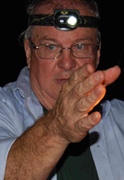
Howard Professor of Zoology and Natural History of the Department of Biology
Of the nine species of bats that occur in Vermont, only two were of conservation concern prior to the 21st century. By the winter of 2007-2008, white-nosed syndrome had spread into Vermont, Massachusetts, and Connecticut and killed somewhere on the order of 600,000 bats. White-nosed syndrome continues to spread and has now been verified in nine states. It may have resulted in the death of as many as 2.5 million bats in the northeastern United States. Professor Kilpatrick presented the current knowledge of the cause of white-nose syndrome along with ongoing research and survey work to assess the impact of this emerging condition and other threats to Vermont bat populations.
Audio
Video
Read the rest of this entry »
Dean's Lecture Award Series | Comments Off on C. William Kilpatrick, “The Mystery of White-nose Syndrome”
Posted: October 28th, 2009 by Arts & Sciences Computing Services Office
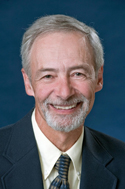 Professor, Department of Chemistry
Professor, Department of Chemistry
Molecules taking part in chemical and biochemical reactions receive their energy either thermally (i.e., heat), photo-chemically (light), or through electron transfer (electricity). The last of these often requires transfer of a single electron from one molecule to another. Given that an electron is, by far, the smallest of the major subatomic particles, and that molecules (and even atoms) have dozens to hundreds of them, how can electron-transfer reactions trigger so many important processes of great diversity, from the easily understood operation of batteries to the amazing and complex reactions involved in respiration and photosynthesis? Dr. Geiger’s lecture took us on a journey that started with simple electron clouds and led to the speaker’s favorite organometallic electron-transfer reactions.
Video (MP4) Audio (MP3)
Read the rest of this entry »
Dean's Lecture Award Series | Comments Off on William Geiger, “How Can One Small Electron Make Such a Big Difference?”
Posted: October 6th, 2009 by Arts & Sciences Computing Services Office
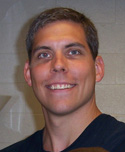
Professor, Department of Psychology
Tobacco use and dependence rates are disproportionately high among those with anxiety and its disorders. Professor Zvolensky provided an overview of the scientific literature on anxiety, smoking, and smoking cessation. He also discussed current promising treatment and prevention approaches for smokers with anxiety risk factors and disorders.
The College of Arts and Sciences Full Professor Lecture Series was designed two years ago to recognize faculty newly promoted to full professor rank. Dr. Zvolensky is the Richard and Pamela Ader Green and Gold Professor.
Video (MP4) Audio (MP3)
Full Professor Lecture Series | Comments Off on Michael Zvolensky, “Anxiety, Smoking and Smoking Cessation”
Posted: March 31st, 2009 by Arts & Sciences Computing Services Office
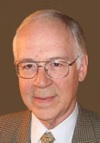 We can’t escape seeing the world in terms of patterns. The patterns in turn help us connect things in the world to larger frames of significance. How does this apply to religion? For centuries people have tried to figure out the themes common to all religions. Professor Paden will illustrate how these patterns of “comparative religion” reflect changing worldviews, from an age of Christian allegory to the current times of evolutionary biology.
We can’t escape seeing the world in terms of patterns. The patterns in turn help us connect things in the world to larger frames of significance. How does this apply to religion? For centuries people have tried to figure out the themes common to all religions. Professor Paden will illustrate how these patterns of “comparative religion” reflect changing worldviews, from an age of Christian allegory to the current times of evolutionary biology.
The College of Arts and Sciences Dean’s Lecture Series honors faculty members who are both excellent teachers and highly respected professionals in their own disciplines. Professor William Paden is the Spring 2009 recipient of this honor.
Video (MP4) Audio (MP3)
Tags: Paden, Patterns, Religion
Dean's Lecture Award Series | Comments Off on William Paden, “Mapping the Gods: Comparative Religion and the Search for Patterns”
Posted: February 10th, 2009 by Arts & Sciences Computing Services Office

Mountains form some of the largest and most beautiful geological features on our planet. Yet despite their occurrence on all the continents we still don’t understand much about the forces and processes that shape the evolution of mountain ranges and operate deep within their interiors. One of the reasons for this lack of knowledge is that, like icebergs, most of the mass of mountain ranges lies deep beneath the Earth’s surface. This talk looks at some of the techniques and results that geologists have utilized to examine the deep interiors of mountain ranges.
Video (MP4) Audio (MP3)
Read the rest of this entry »
Tags: CAS, Full Professor, Geology, Mountain Ranges
Full Professor Lecture Series | Comments Off on Keith Klepeis, “The Geology of Mountain Ranges: A View from Deep beneath the Earth’s Surface”
Posted: January 14th, 2009 by Arts & Sciences Computing Services Office

When Fred Tuttle exposed the rest of the world to Vermont’s unique dialect in the 1996 film Man with the Plan, it seemed the classic accent was alive and well. Not so, according to Julie Roberts, professor of communication sciences, who says most young Vermonters today display very few elements of the state’s folksy way of talking.
One aspect remains, however: a speech variable known as glottalization. The term, most often noted in Great Britain and Ireland, describes a break in a word that would otherwise flow as one. Ask a true Vermonter to say the towns of Milton or Swanton and you’ll recognize it right away as Milt’n or Swant’n. Roberts talked about glottalizing and other unique aspects of regional dialects during her College of Arts and Sciences Full Professor lecture on Jan. 13 in Memorial Lounge, Waterman. Author: Jon C. Reidel
Video (in MP4 format)
Audio only (in MP3 format)
Read the rest of this entry »
Tags: 2009, Communication Sciences, Full Professor Lecture Series
Full Professor Lecture Series | Comments Off on Julie Roberts, “Disappearing or Only Different: Vermont Speech in the 21st Century,”
Posted: November 6th, 2008 by Arts & Sciences Computing Services Office
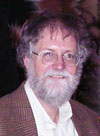 In his fall 2008 Dean’s Lecture, Professor of German Dennis Mahoney explores Wagner’s tetralogy as inspiration for a number of works that followed it ó including Tolkien, Peter Jackson and Howard Shore’s takes on The Lord of the Rings. He also discusses why German writers and composers from the time of the Enlightenment through literary and musical Romanticism pay such close attention to the economic, political, religious, and erotic value that human beings invest in material objects.
In his fall 2008 Dean’s Lecture, Professor of German Dennis Mahoney explores Wagner’s tetralogy as inspiration for a number of works that followed it ó including Tolkien, Peter Jackson and Howard Shore’s takes on The Lord of the Rings. He also discusses why German writers and composers from the time of the Enlightenment through literary and musical Romanticism pay such close attention to the economic, political, religious, and erotic value that human beings invest in material objects.
Video (MP4), Audio (MP3)
Read the rest of this entry »
Dean's Lecture Award Series | Comments Off on Dennis Mahoney, “Rings and Precious Things in German Literary and Musical Culture.”
Posted: October 7th, 2008 by Arts & Sciences Computing Services Office
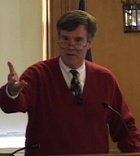
Political Science Professor Gregory Gause examines the various arguments in the academic literature about the relationship between oil and domestic politics in oil-producing states, with particular emphasis on how oil wealth affects the prospects of developing democratic policies.
Video (MP4 format)
Podcast (MP3 format)
Tags: F. Gregory Gause, Full Professor Lecture Series, Iraq, Oil, Political Science
Full Professor Lecture Series | Comments Off on F. Gregory Gause “Oil, Politics and Democracy in the Middle East…and What That Might Tell Us about Iraq”



 Professor, Department of Chemistry
Professor, Department of Chemistry
 We can’t escape seeing the world in terms of patterns. The patterns in turn help us connect things in the world to larger frames of significance. How does this apply to religion? For centuries people have tried to figure out the themes common to all religions. Professor Paden will illustrate how these patterns of “comparative religion” reflect changing worldviews, from an age of Christian allegory to the current times of evolutionary biology.
We can’t escape seeing the world in terms of patterns. The patterns in turn help us connect things in the world to larger frames of significance. How does this apply to religion? For centuries people have tried to figure out the themes common to all religions. Professor Paden will illustrate how these patterns of “comparative religion” reflect changing worldviews, from an age of Christian allegory to the current times of evolutionary biology.

 In his fall 2008 Dean’s Lecture, Professor of German Dennis Mahoney explores Wagner’s tetralogy as inspiration for a number of works that followed it ó including Tolkien, Peter Jackson and Howard Shore’s takes on The Lord of the Rings. He also discusses why German writers and composers from the time of the Enlightenment through literary and musical Romanticism pay such close attention to the economic, political, religious, and erotic value that human beings invest in material objects.
In his fall 2008 Dean’s Lecture, Professor of German Dennis Mahoney explores Wagner’s tetralogy as inspiration for a number of works that followed it ó including Tolkien, Peter Jackson and Howard Shore’s takes on The Lord of the Rings. He also discusses why German writers and composers from the time of the Enlightenment through literary and musical Romanticism pay such close attention to the economic, political, religious, and erotic value that human beings invest in material objects.